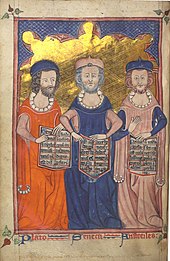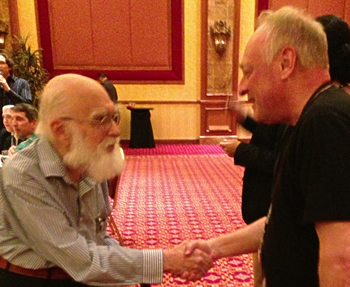The revival of humanisms
I want to explore the idea of Greek philosophy as a meeting-point between various humanisms, including Christian humanism, atheist or agnostic humanism, Islamic humanism and Jewish humanism.
These days, I would describe myself as a Christian humanist. I mean ‘humanist’ in the Renaissance sense - someone who loves and wants to revive ancient philosophy and culture. And I mean ‘Christian humanist’ in the sense of believing that Christianity complements and even completes Greek philosophy.

For many Medieval and Renaissance Christians, as well as for some Jewish and Islamic philosophers, the great Greek and Roman philosophers were prophets or saints. Their profound insights into human nature and the universe helped to lead people out of suffering, like Virgil leading Dante out of Hell in the Divine Comedy.
The revelation of Greek philosophy is this: much of our suffering comes from our thoughts, beliefs and values. We construct our own prisons. We can liberate ourselves from these prisons by learning to examine our souls and to be wiser in our thinking. We can use our reason to shine a light onto our unconscious habits, and to create new, wiser habits. We can learn to take care of our souls, to be the doctors to ourselves.
We cause ourselves suffering by caring for the wrong things, by putting our trust in the wrong things, by worshipping false gods (as Plato puts it), and building our houses on sand (as Jesus put it). We can find a deeper fulfillment by looking within, by cultivating an inner garden of consciousness and reason, and also by cultivating caring and ethical relationships with other people.
Both atheist / agnostic and theist Greek philosophers would agree with what I’ve written above. But they disagreed in their definition of ‘flourishing’, and on the question of where reason comes from. Plato, Aristotle, Heraclitus, Pythagoras and the Stoics thought consciousness comes from God, while Epicurus thought it was a cosmic fluke. I was always more on the theistic side of Greek philosophy. I thought it more likely that our consciousness is God-given, that it’s a fragment of God (or the Logos). I also believed, rather more speculatively, that this Logos is providential, guiding us towards an end or telos.
Why 'Christian' humanism?
I’ve become a Christian humanist this year for two reasons. Firstly, I believe in grace. I’ve moved from believing in the Stoic Logos, which is a rather abstract and chilly cosmic intelligence which doesn’t particularly care about individual cases, to believing in a God who loves us as individuals and who occasionally intervenes in our life, lifts us up and heals us through grace.
It was one such experience of grace, back in 2001, which helped me recover from post-traumatic stress disorder and which led me to Greek philosophy. I’ve had some more experiences like that this year. I don’t think this makes me in any way special - such experiences are in fact fairly common among humans, we’re just embarrassed to speak about them in our materialist culture.
Why would I interpret these experiences in a Christian framework? Partly because this year I experienced them in a Christian context, and partly because the New Testament gives a better account of such experiences when talking about the healing power of the Holy Spirit and Christ’s love. Greek philosophers don't really talk about God's love healing us (although the playwright Sophocles does). In Greek philosophy, God is an abstract concept you reach through rational dialectic. In Judeo-Christianity, God is a Being with whom you can have a loving relationship. I believe the latter is true.
Feeding our need for community
The second reason I became a Christian is that I was hungry for spiritual community. I’ve been a total individualist all my adult life - a freelance journalist, usually single, socially anxious, bit of a hermit. I am the archetypal modern liberal, suspicious of all communities and organisations, yet longing to find one I can call home. I agree with Jean Vanier that loneliness is one of the great sicknesses of our liberal culture.
I am all for trying to develop ethical communities for non-believers where, in the words of Daniel Dennett, ‘people who are not otherwise loved can be taken in and their lives can be made important’. I would love philosophy clubs to be such places, as well as organisations like the School of Life, the Sunday Assembly, Action for Happiness clubs. I’ve worked with all these organisations and think they’re on to something important. But there's a way to go yet, in terms of creating spaces where people can bring all of themselves - their baggage, their wounds, their vulnerability - and feel ministered to.
This year, I’ve been exploring Christian community. I guess I started my explorations at the end of last year, when I was dating a lovely girl, and we went to stay at a cottage in Wales with some other friends of hers. They all turned out to be Christians, in fact one of them was a vicar. This initially freaked me out (trapped in a cottage with Christians! aaargh!) but actually I was really impressed by their commitment to one another, by their sincerity and their humour. They were human beings, not Bible-bashing zombies. They listened to each other, cared for one another, allowed each other to be fallible human beings.

The vicar at that cottage invited me on the Alpha course, which I did at the beginning of this year. I really enjoyed it, partly because of the power of small groups - it’s a wonderful experience to turn up, once a week, with the same group of people, to talk, listen and support each other. We still meet, every other Tuesday evening. Roughly half of us are non-Christian. Humanist groups and philosophy groups have also drawn on this power of small groups in the past and are doing so again. For example, Richard Layard, the founder of Action for Happiness, was inspired by attending a Quaker small group for a year or so, and is now launching an Alpha-style course for humanists (more on that when I get the details).
Of course, the Alpha course has some slightly more, er, supernatural aspects, like asking the Holy Spirit to come in to you. There’s also an emphasis on praying for each other. I personally think this is a beautiful practice. Think of prayer as wishing each other well, deeply. Christians pray, sometimes, by putting a hand on each other’s shoulders. I think touch is important. These days, we hear ‘touch’ and because we’re liberals we think ‘Ugh! Violation of privacy!‘ But we need touch. We’re primates. We have a touch-deficit in our lives. Touch can be as simple as shaking each other’s hands and giving each other the ‘sign of peace’. Touch is healing.
Christian community also puts music at the centre. Initially, I found the contemporary worship very off-putting. I felt it was a desecration of the religion of rock & roll. How dare they play rock music - they’re Christians, the epitome of Uncool. Even worse, some of the Christians there would put their hands in the air and dance. I would look at them, as Michal looked down at David, and think, you poor, poor people.

It is absolutely fine to put your hands in the air and dance at a club or music festival. It’s fine to raise your hands in a diamond-gesture to worship Jay-Z; fine to raise your hands in worship of Manchester City or Blackpool FC; fine to raise your hands to worship your country at a football match (less cool at a a nationalist rally). But if you raise your hands to worship God then, my friend, you are a nutter.
Well...I still think most Christian rock is pretty cheesy. But some of it is OK, and a handful of songs I actually like, and I’m OK with people raising their hands to worship God. I like worshipping God with other people, through music. No, actually, I love it. It’s a really powerful, wonderful experience, hearing a hundred or a thousand people lifting up their voices around you, affirming your deepest beliefs. Again, humanist groups do this too - I occasionally play the drums at the Sunday Assembly, and sometimes people even raise their hands to the music. Charismatic atheists!
Humanism is also civic, outward-looking, engaged with society. I admire the social work which some of my Christian friends do, in an effort to follow the example of Christ. Some of them have gone off to live in deprived estates, some of them left lucrative careers to set up charities, some of them went to live with mentally disabled people, some of them turned their homes into refuges for addicts.
And I admire the leadership of the Christian community I’ve been engaged with - Nicky and Pippa Gumbel. I admire their humility, the fact they run a huge global movement but haven’t been seduced by money, power or fame. They still ride around on their bicycles and live in the vicarage. Thousands of people come to their church, yet they know the name of all the people in my Alpha group, and care about us. Their community is not perfect by any means, but it’s more nurturing and less corrupted by money or power than most philosophical / self-help communities I’ve encountered. The good thing about belonging to a very old and established church like the C of E is it’s bigger than you and your ego. Newer churches or self-help movements can easily become vehicles for their leaders’ egos.

It is not at all easy to create a community where people feel loved. It’s hard to care about other people, because people are annoying and needy. So we keep other people at arms’ length. I remember a famous philosopher saying of someone ‘oh, they’re very needy’. In Greek philosophy and liberal humanism, neediness is weakness and autonomy is strength. Christian communities, by contrast, are OK with people’s neediness. Christian priests are trained to minister to that need. Does humanism have servants, people who are willing to give their lives to minister to other people and to put them before their own egos? I think James Randi is close - he ministers to the Skeptic community, writing postcards to Skeptics around the world, keeping in touch, giving out hugs at The Amazing Meeting.
I have friends trying to cultivate caring communities for atheists and I’m all for that, because humans need community, and as humanists, we share a common tradition in Greek philosophy. Personally, I would also like to see the revival of the Church of England, and the revival of the Christian humanist tradition within the Church. I would like to see the revival of all humanisms, and of friendship between them.
